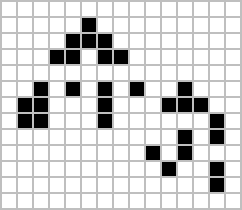2c/5 orthogonal
| 2c/5 orthogonal | ||
| ||
| Spaceship | Yes | |
|---|---|---|
| Puffer | Yes | |
| Rake | Yes | |
| Wickstretcher | No | |
| Gun | Yes | |
2c/5 orthogonal is an orthogonal speed that is equivalent to two fifths of the speed of light.
Spaceships
The first 2c/5 orthogonal spaceship, 44P5H2V0, was discovered by Dean Hickerson on July 23, 1991. Robert Wainwright and David Bell then found some small tagalongs which could string multiple copies of this spaceship together, resulting in arbitrarily large 2c/5 spaceships. This was the only known way to create 2c/5 spaceships until the discovery of 70P5H2V0 by Hartmut Holzwart on December 5, 1992. The smallest known 2c/5 spaceship, 30P5H2V0, was discovered by Paul Tooke on December 7, 2000.
In May 2000 David Bell and Paul Tooke found the first period 10 2c/5 spaceship. Tooke then found several higher-period spaceships by removing the trailing edge of larger spaceships. Methods of building 2c/5 spaceships of arbitrarily high periods were first created by David Bell and Jason Summers, who constructed adjustable rakes of periods 205 + 10N and 410 + 5N, which could easily be turned into spaceships. Paul Tooke then improved this to 185 + 5N and explicitly constructed spaceships of all periods below 185.
Puffers
The first 2c/5 puffer was built by Jason Summers on February 26, 1999. It worked by having a lightweight spaceship collide with the back of a 2c/5 spaceship. The resulting debris was then perturbed by two passing spaceships to produce a large cloud of debris and another forward traveling lightweight spaceship some distance away. The mirror image of this initial reaction was put on the other side to create a glide symmetric period 10150 puffer.
David Bell and Paul Tooke created the first versatile 2c/5 puffer in June, 2000. By removing the back ends of spaceships Tooke then found several low period puffers including periods 10 and 15. Mostly due to Paul Tooke, all 2c/5 puffer periods are known.
Rakes
David Bell and Jason Summers created the first adjustable period rakes with periods 205 + 10N and 410 + 5N. Paul Tooke then improved this to 200 + 5N and later to 185 + 5N. Tooke also explicitly constructed 2c/5 rakes of all possible periods below 185 except 10 and 15, which would necessarily be backrakes.
Wickstretchers
No 2c/5 orthogonal wickstretchers are currently known.
Guns
In May 2000, Noam Elkies proposed that a glider synthesis could be found for 60P5H2V0. The 63-glider synthesis was completed by Noam Elkies and Jason Summers in March 2003 with help from Mark Niemiec. This synthesis allowed the construction of the first gun that fired spaceships of a speed other than c/4 diagonal or c/2 orthogonal, the P416 60P5H2V0 gun, built on April 11, 2003. Jason Summers built a period 690 gun independently later that year. Summers also constructed a period 240 c/2 orthogonal rake which fires 2c/5 spaceships.
See also
References
- David Bell's article, "Spaceships in Conway's Life (Part 6)"
- Paul Tooke's 2c/5 puffer collection
- "glider synthesis". The Life Lexicon. Stephen Silver.
External links
- 2c/5 spaceship at the Life Lexicon

